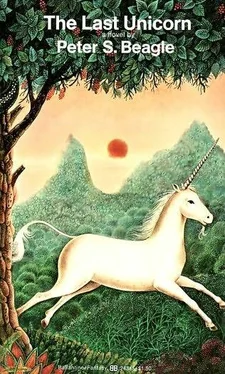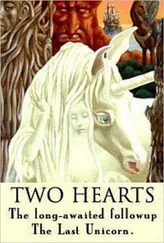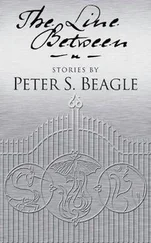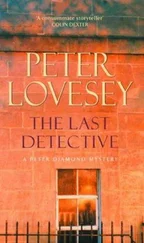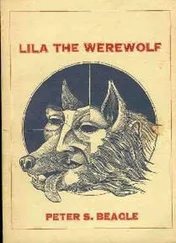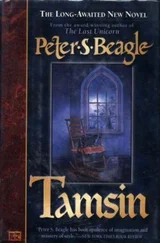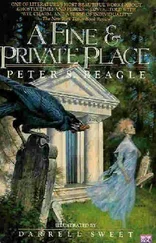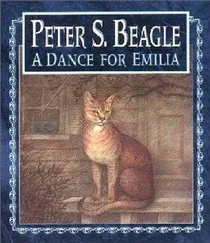Her voice was a child's thin, sad mumble. She said, "But that will never happen to you. Everyone loves you."
They had a moment to look at each other, the two women: the one fair and foreign in the cold, low room; the other appearing quite at home in such surroundings — an angry little beetle with her own kitchen beauty. Then they heard boots scraping, armor clicking, and the gusty voices of old men. King Haggard's four men-at-arms came trooping into the scullery.
They were all at least seventy years old, gaunt and limping, fragile as crusted snow, but all clad from head to foot in King Haggard's miserly mail and bearing his wry weapons. They entered hailing Molly Grue cheerfully and asking what she had made for their supper, but at the sight of the Lady Amalthea all four became very quiet and bowed deep bows that made them gasp.
"My lady," said the oldest of the men, "command your servants. We are used men, spent men — but if you would see miracles, you have only to request the impossible of us. We will become young again if you wish it so." His three comrades muttered their agreement.
But the Lady Amalthea whispered in answer, "No, no, you will never be young again." Then she fled from them, with her wild, blinding hair hiding her face, and the satin gown hissing.
"How wise she is!" the oldest man-at-arms declared. "She understands that not even her beauty can do battle with time. It is a rare, sad wisdom for one so young. That soup smells delicious, Molly."
"It smells too savory for this place," a second man grumbled as they all sat down around the table. "Haggard hates good food. He says that no meal is good enough to justify all the money and effort wasted in preparing it. 'It is an illusion, says he, 'and an expense. Live as I do, undeceived. Brraaahh!" He shuddered and grimaced, and the others laughed.
"To live like Haggard," said another man-at-arms as Molly spooned the steaming soup into his bowl. "That will be my fate in the next world, if I don't behave myself in this one."
"Why do you stay in his service, then?" Molly demanded. She sat down with them and rested her chin on her hands. "He pays you no wages," she said, "and he feeds you as little as he dares. He sends you out in the worst weather to steal for him in Hagsgate, for he never spends a penny of the wealth in his strong room. He forbids everything, from lights to lutes, from fires to fairs and singing to sinning; from books and beer and talk of spring to games you play with bits of string. Why not leave him? What in the world is there to keep you here?"
The four old men looked nervously at one another, coughing and sighing. The first said, "It is our age. Where else could we go? We are too old to be wandering the roads, looking for work and shelter."
"It is our age," said the second man-at-arms. "When you are old, anything that does not disturb you is a comfort. Cold and darkness and boredom long ago lost their sharp edges for us, but warmth, singing, spring — no, they would all be disturbances. There are worse things than living like Haggard."
The third man said, "Haggard is older than we are. In time Prince Lír will be king in this country, and I will not leave the world until I have seen that day. I have always been fond of the boy, since he was small."
Molly found that she was not hungry. She looked around at the faces of the old men, and listened to the sounds their seamy lips and shrunken throats made as they drank her soup; and she was suddenly glad that King Haggard always had his meals alone. Molly inevitably came to care for anyone she fed.
Cautiously she asked them, "Have you ever heard a tale that Prince Lír is not Haggard's adopted nephew at all?" The men-at-arms showed no surprise at the question.
"Ay," the eldest replied, "we know that story. It may well be true, for the prince certainly bears no family resemblance to the king. But what of it? Better a stolen stranger ruled the land than a true son of King Haggard."
"But if the prince was stolen from Hagsgate," Molly cried, "then he is the man who will make the curse on this castle come true!" And she repeated the rhyme that the man Drinn had recited in the inn at Hagsgate.
"Yet none but one of Hagsgate town
May bring the castle swirling down."
But the old men shook their heads, grinning with teeth as rusty as their casques and corselets. "Not Prince Lír," the third man said. "The prince may slay a thousand dragons, but he will level no castles, overthrow no kings. It is not in his nature. He is a dutiful son who seeks — alas — only to be worthy of the man he calls his father. Not Prince Lír. The rhyme must speak of some other."
"And even if Prince Lír were the one," the second man added, "even if the curse had marked him for its messenger, still he would fail. For between King Haggard and any doom stands the Red Bull."
A silence sprang into the room and stood there, darkening all faces with its savage shadow and chilling the good hot soup with its breath. The little autumn cat stopped purring on Molly's lap, and the thin cooking fire cowered down. The cold scullery walls seemed to draw closer together.
The fourth man-at-arms, who had not spoken before, called across the dark to Molly Grue, "There is the true reason that we stay in Haggard's employ. He does not wish us to leave, and what King Haggard wishes or does not wish is the only concern of the Red Bull. We are Haggard's minions, but we are the Red Bull's prisoners."
Molly's hand was steady as she stroked the cat, but her voice was pinched and dry when she spoke. "What is the Red Bull to King Haggard?"
It was the oldest man-at-arms who answered. "We do not know. The Bull has always been here. It serves Haggard as his army and his bulwark; it is his strength and the source of his strength; and it must be his one companion as well, for I am sure he descends to its lair betimes, down some secret stair. But whether it obeys Haggard from choice or compulsion, and whether the Bull or the king is the master — that we have never known."
The fourth man, who was the youngest, leaned toward Molly Grue, his pink, wet eyes suddenly eager. He said, "The Red Bull is a demon, and its reckoning for attending Haggard will one day be Haggard himself." Another man interrupted him, insisting that the clearest evidence showed that the Bull was King Haggard's enchanted slave, and would be until it broke the bewitchment that held it and destroyed its former lord. They began to shout and spill their soup.
But Molly asked, not loudly, but in a way that made them all be still, "Do you know what a unicorn is? Have you ever seen one?"
Of everything alive in the little room, only the cat and the silence seemed to look back at her with any understanding. The four men blinked and belched and rubbed their eyes. Deep, restless, the sleeping Bull stirred again.
The meal being over, the men-at-arms saluted Molly Grue and left the scullery, two for their beds, two to take up their night's vigil in the rain. The oldest of the men waited until the others were gone before he said quietly to Molly, "Be careful of the Lady Amalthea. When she first came here, her beauty was such that even this accursed castle became beautiful too — like the moon, which is only a shining stone. But she has been here too long. Now she is as beautiful as ever, but the rooms and roofs that contain her are somehow meaner for her presence."
He gave a long sigh, which frayed into a whine. "I am familiar with that kind of beauty," he said, "but I had never seen that other sort before. Be careful of her. She should go away from here."
Alone, Molly put her face in the little cat's random fur. The cooking fire fluttered low, but she did not get up to feed it. Small, swift creatures scuttled across the room, making a sound like King Haggard's voice; and the rain rumbled against the castle walls, sounding like the Red Bull. Then, as though in answer, she heard the Bull. His bellow shattered the stones under her feet, and she clutched desperately at the table to keep herself and the cat from plunging down to him. She cried out.
Читать дальше
